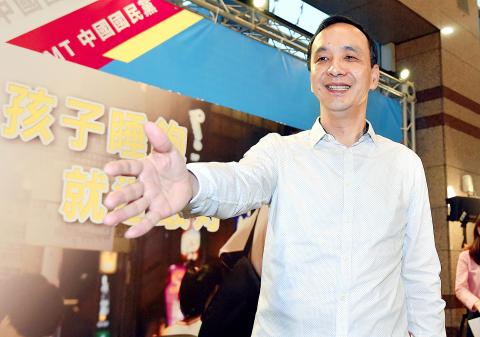Chinese Nationalist Party (KMT) Chairman Eric Chu’s (朱立倫) justification for replacing Deputy Legislative Speaker Hung Hsiu-chu (洪秀柱) as the party’s presidential candidate does not seem to hold water, as he appears to be even more unpopular than Hung among pan-blue supporters, a survey released yesterday showed.
The poll, conducted by Taiwan Indicators Survey Research on Monday and Tuesday, showed that nearly 57 percent of respondents feel unfavorably toward Chu, with only 24 percent saying they had a good impression of the KMT chairman.
That compares with a similar poll carried out by the research group last month — when Hung was still the KMT’s candidate — with 52 percent of respondents expressing their disfavor of the deputy legislative speaker, while 30 percent supported her.

Photo: Liao Chen-huei, Taipei Times
Chu, who has been hailed by most KMT members as the party’s only hope of continuing its reign, also received a higher disapproval rating of 22.1 percent among respondents identified as pan-blue than Hung, who garnered 17.3 percent in last month’s survey.
The results indicate that the aftermath of the KMT’s controversial move on Oct. 17 to force Hung out of the Jan. 16 presidential race and nominate Chu instead continues to take a toll on the chairman’s election prospects, the survey center said.
The results also undercut the KMT’s rationale behind removing Hung, which cited her consistently lackluster support ratings, which the party said could jeopardize its legislative majority, as well as her pro-unification policies, which it said strayed from the party’s cross-strait stance.
Asked who they plan to vote for in the presidential election, 47.1 percent of respondents said they would support Democratic Progressive Party (DPP) presidential candidate Tsai Ing-wen (蔡英文), 16.4 percent said they favored Chu and 10.2 percent preferred People First Party (PFP) challenger James Soong (宋楚瑜). Thirteen percent said they would abstain from voting, while 13.4 percent declined to express an opinion.
It is worth noting that Chu’s support rating was close to that of Hung — at 15.6 percent in a survey released on Oct. 15 — before she was edged out by her own party.
As for their perception about major political parties in Taiwan and China, 42 percent of those polled had a good opinion of the DPP, compared with 21.6 percent for the KMT and 13.7 percent for the Chinese Communist Party.
The poll collected 1,004 valid samples from residents aged 20 or above across the nation. It has a confidence level of 95 percent and a margin of error of 3.1 percentage points.

A Ministry of Foreign Affairs official yesterday said that a delegation that visited China for an APEC meeting did not receive any kind of treatment that downgraded Taiwan’s sovereignty. Department of International Organizations Director-General Jonathan Sun (孫儉元) said that he and a group of ministry officials visited Shenzhen, China, to attend the APEC Informal Senior Officials’ Meeting last month. The trip went “smoothly and safely” for all Taiwanese delegates, as the Chinese side arranged the trip in accordance with long-standing practices, Sun said at the ministry’s weekly briefing. The Taiwanese group did not encounter any political suppression, he said. Sun made the remarks when

The Taiwanese passport ranked 33rd in a global listing of passports by convenience this month, rising three places from last month’s ranking, but matching its position in January last year. The Henley Passport Index, an international ranking of passports by the number of designations its holder can travel to without a visa, showed that the Taiwan passport enables holders to travel to 139 countries and territories without a visa. Singapore’s passport was ranked the most powerful with visa-free access to 192 destinations out of 227, according to the index published on Tuesday by UK-based migration investment consultancy firm Henley and Partners. Japan’s and

BROAD AGREEMENT: The two are nearing a trade deal to reduce Taiwan’s tariff to 15% and a commitment for TSMC to build five more fabs, a ‘New York Times’ report said Taiwan and the US have reached a broad consensus on a trade deal, the Executive Yuan’s Office of Trade Negotiations said yesterday, after a report said that Washington is set to reduce Taiwan’s tariff rate to 15 percent. The New York Times on Monday reported that the two nations are nearing a trade deal to reduce Taiwan’s tariff rate to 15 percent and commit Taiwan Semiconductor Manufacturing Co (TSMC, 台積電) to building at least five more facilities in the US. “The agreement, which has been under negotiation for months, is being legally scrubbed and could be announced this month,” the paper said,

MIXED SOURCING: While Taiwan is expanding domestic production, it also sources munitions overseas, as some, like M855 rounds, are cheaper than locally made ones Taiwan and the US plan to jointly produce 155mm artillery shells, as the munition is in high demand due to the Ukraine-Russia war and should be useful in Taiwan’s self-defense, Armaments Bureau Director-General Lieutenant General Lin Wen-hsiang (林文祥) told lawmakers in Taipei yesterday. Lin was responding to questions about Taiwan’s partnership with allies in producing munitions at a meeting of the legislature’s Foreign Affairs and National Defense Committee. Given the intense demand for 155mm artillery shells in Ukraine’s defense against the Russian invasion, and in light of Taiwan’s own defensive needs, Taipei and Washington plan to jointly produce 155mm shells, said Lin,